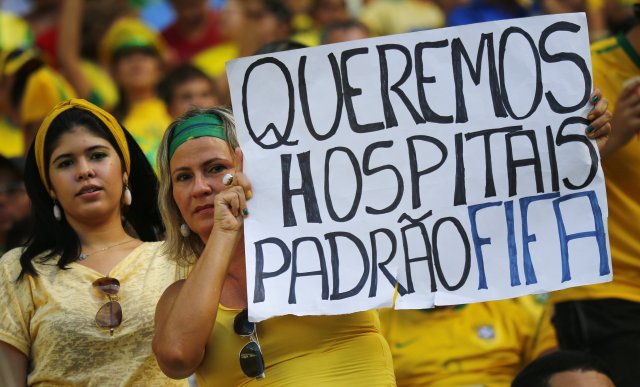
One has to hark back to 1968 in Mexico City, when thousands of students and workers marched against the Olympics, to find a sports-related demonstration that compares to the size and militancy of the mass anti-World Cup/Olympic protests taking place in Brazil.
As in Mexico City, thousands of people in Brazil took to the streets — and outside of stadiums hosting Confederations Cup matches — raising slogans that connect the spending and austerity that surround these mega-events to a much deeper rot in the nation’s democratic institutions.
As in Mexico City, the central question was one of priorities: spending for sports while other vital needs — health, education, transportation — go unheeded.
As in Mexico City, the spine of protesters were disaffected youth, educated beyond their parents’ generation because of expansions in higher education, but without jobs or opportunity when leaving the academy.
As in Mexico City, the ruling elites feel a desperate need for the events to go as planned as a way to demonstrate to the world that they are a leading player in the game of nations.
Also as in Mexico City, we hear the ridiculous canard of those in power not to mix sports and politics. Then it was Avery Brundage, the Nazi-sympathising head of the International Olympic Committee railing against what he called “the politicisation of sport” and saying that “one of the basic principles of the Olympic games [is] that politics play no part whatsoever in them”.
Now it’s the reptilian FIFA chief Sepp Blatter saying: “I can understand that people are not happy, but they should not use football to make their demands heard. Brazil asked to host the World Cup. We did not impose the World Cup on Brazil. They knew that to host a good World Cup they would naturally have to build stadiums.”
And as in Mexico City, the splits in the streets are reflecting themselves in the athletic community as well. Then it was Jesse Owens telling 1968 Olympic protesters John Carlos, Lee Evans, and Tommie Smith — all of whom were influenced by the struggles in Mexico City — to just shut up and play.
Now it’s Brazilian legend Pele saying, “Let's forget all this commotion happening in Brazil, all these protests, and let's remember how the Brazilian squad is our country and our blood.” Another Brazilian soccer hero Ronaldo said in response to critiques over stadium spending, “you can't hold a World Cup with hospitals”.
By contrast, national team star Neymar said in an epic statement: “I've always had faith that it wouldn't be necessary to get to this point, of having to take over the streets, to demand for better transportation, health, education and safety ― these are all government's obligations. My parents worked really hard to offer me and my sister a good quality life.
“Today, thanks to the success that fans have afforded me, it might seem like a lot of demagogy from me — but it isn't — raising the flag of the protests that are happening in Brazil. But I am Brazilian and I love my country. I have family and friends who live in Brazil! That's why I want a Brazil that is fair and safe and healthier and more honest!
“The only way I have to represent Brazil is on the pitch, playing football and, starting today against Mexico, I'll get on the pitch inspired by this mobilisation.”
True to his word, Neymar starred in the victory against Mexico.
The differences are also crucial to recognise. In 1968, the student and workers movement in Mexico City was politically organised with many protesters being aligned with the National Strike Council, a group that had delegates from 240 schools. Their demands were public and organised.
The protests in Brazil can be better defined as being far more an expression of extreme anger and disaffection. While polls of mass demonstrations should be taken with a grain of salt, one survey of demonstrators shows that 84% don’t ally with any political formation. It’s a catch-all for every grievance under the sun with the World Cup and Olympic spending becoming symbolic of an austerity economy beyond the reach of any semblance of democracy.
This character is both a strength and weakness. It’s a strength because the country is learning lessons in real time about democracy in the streets, with city officials already repealing the hated proposed bus fare hike in an effort to quell demonstrators. It is also a weakness, as forces from the right wing are entering the fray hoping to turn demonstrators against the Workers Party (PT) government and making this an issue about “government spending”.
It's a cheap, opportunistic effort to deflect attention from the corporate feeding frenzy in conjunction with the PT, which is actually taking place behind the green curtain. It also deflects attention from the fact that the right wing in Brazil has no problem with austerity; just who is administering it.
The Mexico City protests of 1968 were drowned in blood with hundreds of students and workers, with aid from US intelligence sources, executed in the Plaza de las Tres Culturas in what’s known as the Tlatelolco Massacre, 10 days before the start of the Olympics.
In Brazil, the government has sought to negotiate with protest organisers and has offered reforms. However, it was announced this week that The National Force, Brazil’s feared federal troops, will be deployed outside stadiums for the duration of the Confederations Cup. We need to keep a close eye on Brazil and provide solidarity to what will now be known forever as the “salad revolution.”
We need to listen to the ghosts of Tlatelolco Square and say that never again will the world turn a blind eye just because “the games must go on.”
[Reprinted from Edge of Sports.]